英语高中牛津译林版选修六Unit 1《Laughter is good for you》课件Ⅱ
文档属性
| 名称 | 英语高中牛津译林版选修六Unit 1《Laughter is good for you》课件Ⅱ | 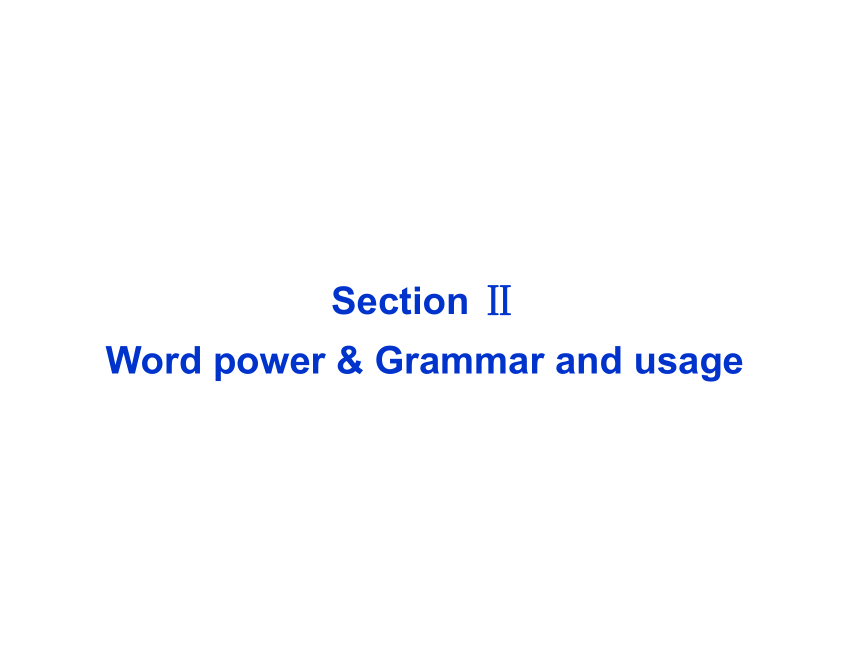 | |
| 格式 | zip | ||
| 文件大小 | 142.3KB | ||
| 资源类型 | 教案 | ||
| 版本资源 | 牛津译林版 | ||
| 科目 | 英语 | ||
| 更新时间 | 2013-03-16 10:52:25 | ||
图片预览

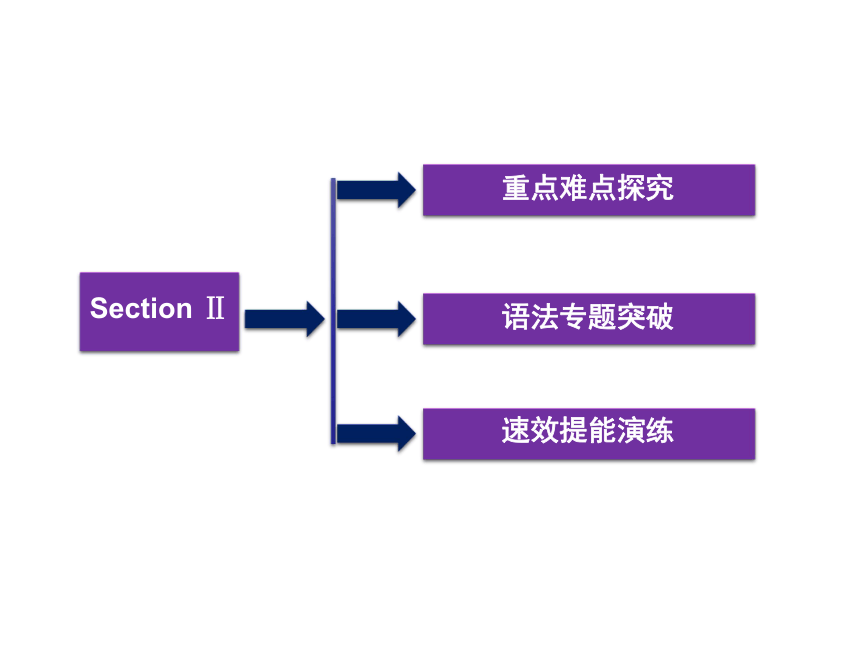
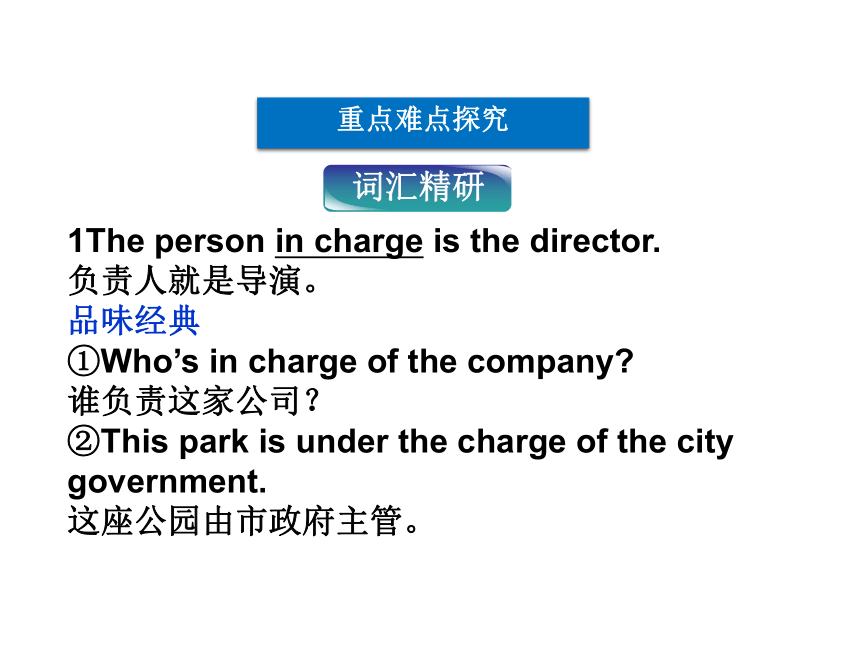
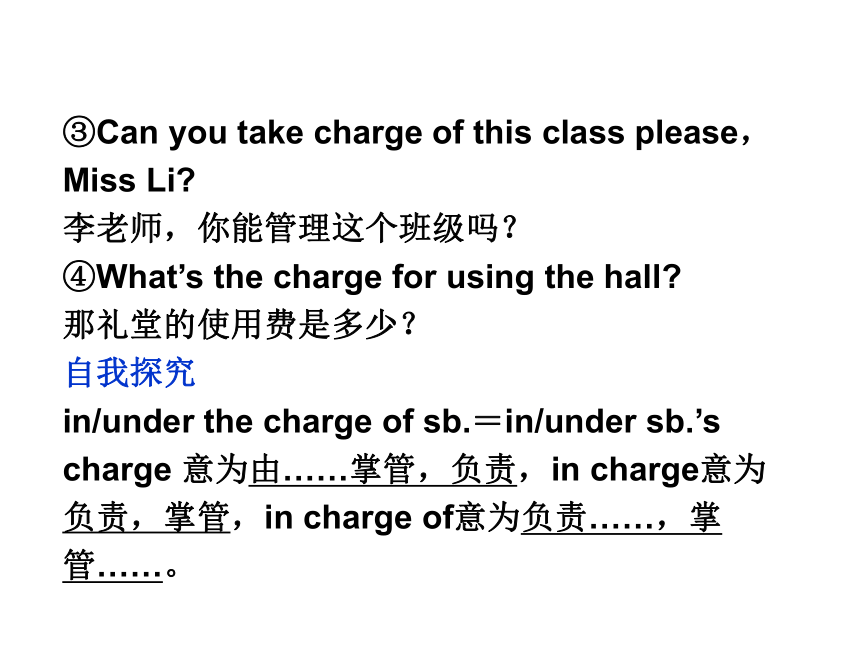
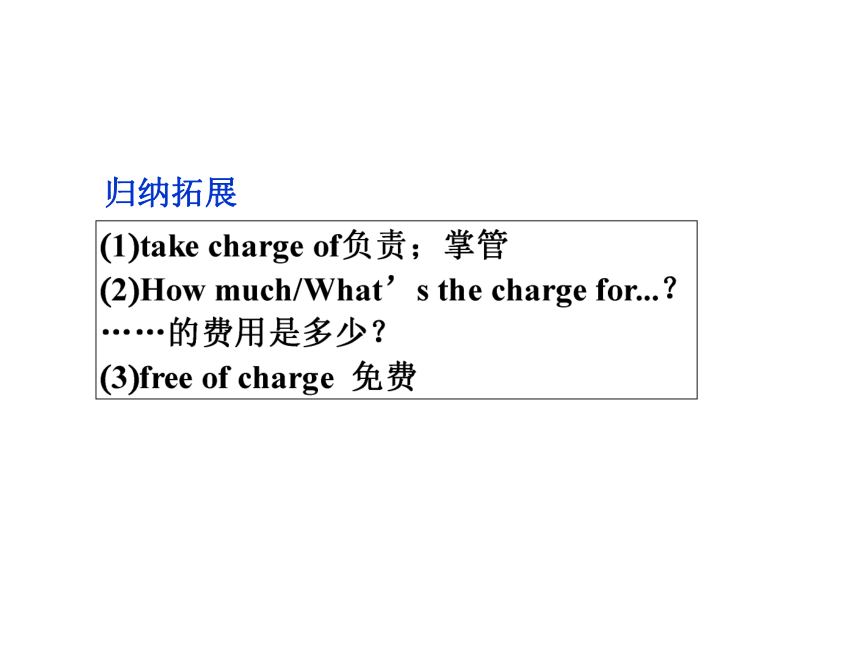

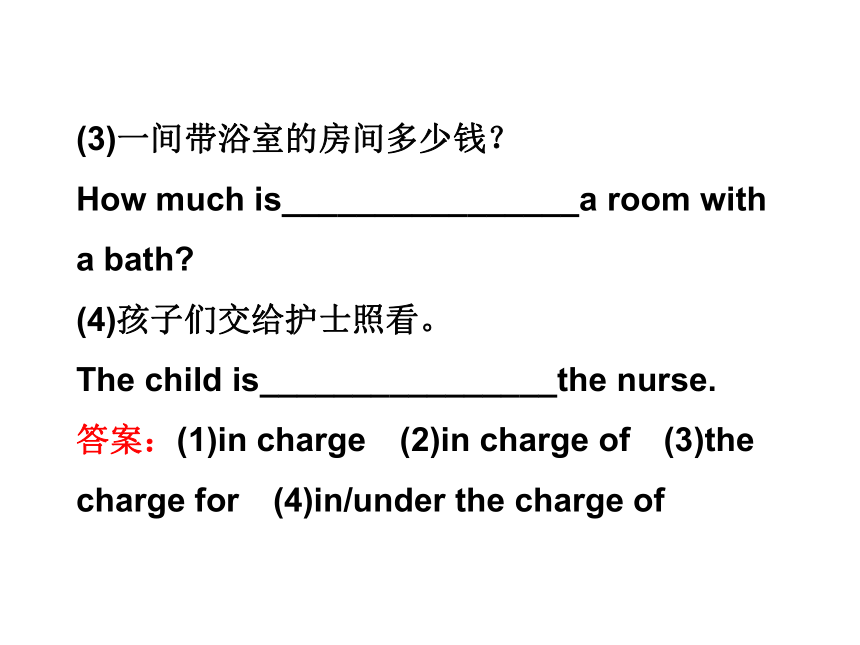
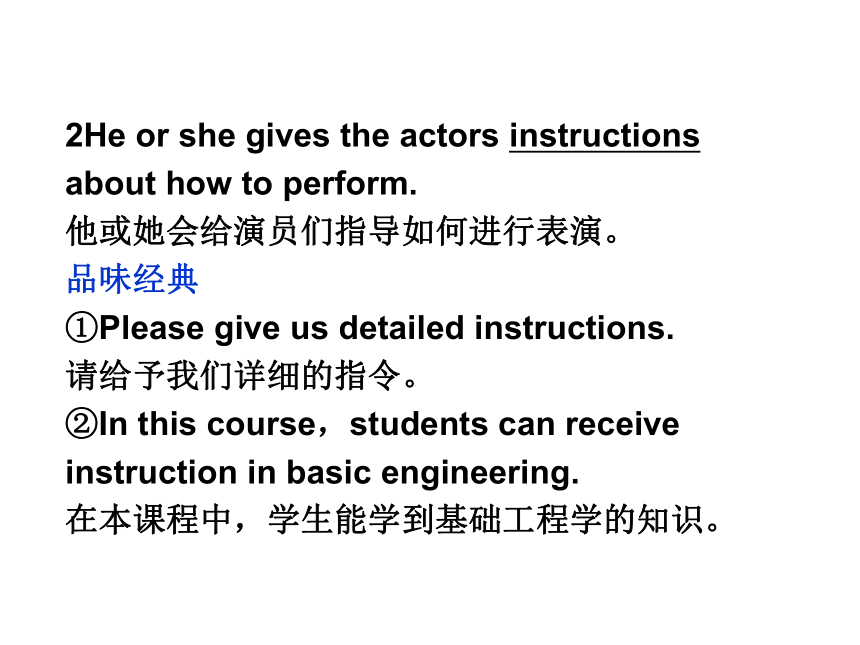
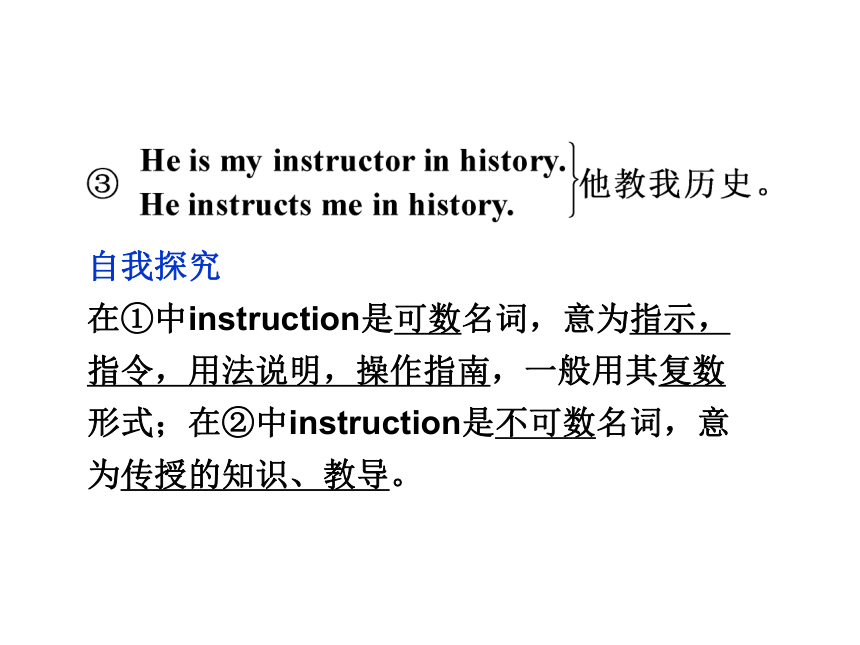

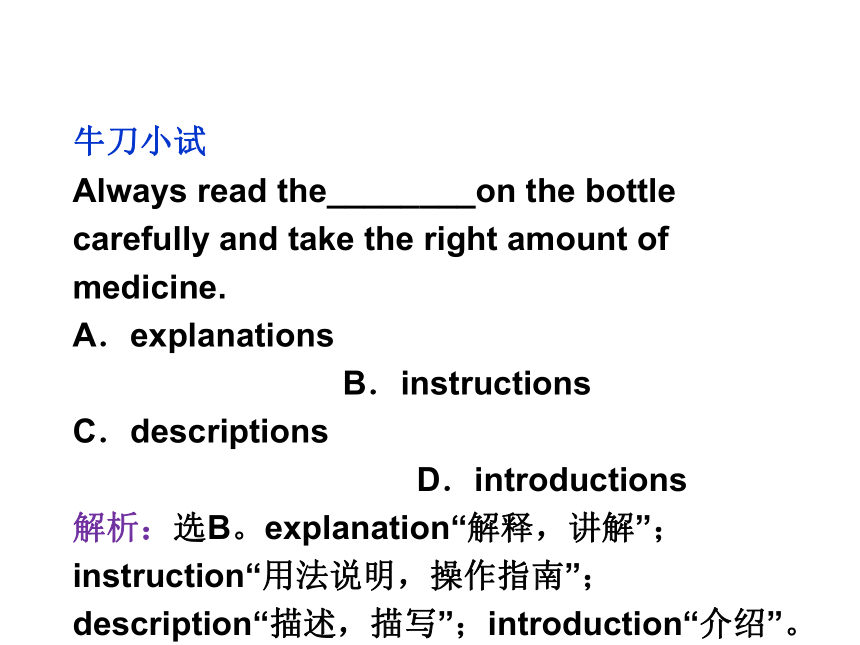
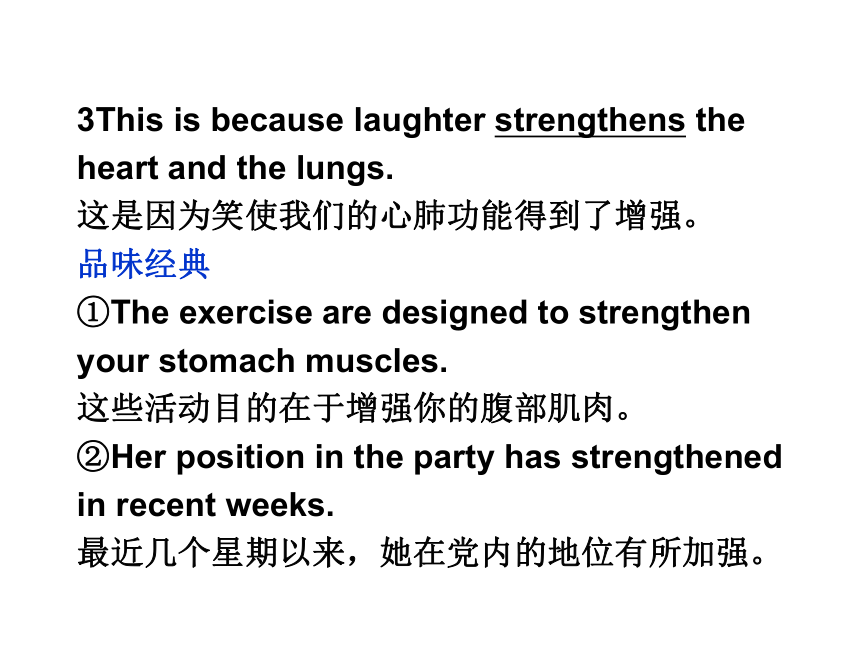
文档简介
课件51张PPT。Section Ⅱ
Word power & Grammar and usage速效提能演练Unit 1语法专题突破 Section Ⅱ重点难点探究重点难点探究1The person in charge is the director.
负责人就是导演。
品味经典
①Who’s in charge of the company?
谁负责这家公司?
②This park is under the charge of the city government.
这座公园由市政府主管。 ③Can you take charge of this class please,Miss Li?
李老师,你能管理这个班级吗?
④What’s the charge for using the hall?
那礼堂的使用费是多少?
自我探究
in/under the charge of sb.=in/under sb.’s charge 意为由……掌管,负责,in charge意为负责,掌管,in charge of意为负责……,掌管……。归纳拓展牛刀小试
完成句子
(1)班主任不在时班长负责。
The monitor will be________________when the headteacher is away.
(2)他父亲掌管这家工厂。
His father is________________ this factory.(3)一间带浴室的房间多少钱?
How much is________________a room with a bath?
(4)孩子们交给护士照看。
The child is________________the nurse.
答案:(1)in charge (2)in charge of (3)the charge for (4)in/under the charge of2He or she gives the actors instructions about how to perform.
他或她会给演员们指导如何进行表演。
品味经典
①Please give us detailed instructions.
请给予我们详细的指令。
②In this course,students can receive instruction in basic engineering.
在本课程中,学生能学到基础工程学的知识。自我探究
在①中instruction是可数名词,意为指示,指令,用法说明,操作指南,一般用其复数形式;在②中instruction是不可数名词,意为传授的知识、教导。归纳拓展牛刀小试
Always read the________on the bottle carefully and take the right amount of medicine.
A.explanations B.instructions
C.descriptions D.introductions
解析:选B。explanation“解释,讲解”;instruction“用法说明,操作指南”;description“描述,描写”;introduction“介绍”。句意为:仔细阅读瓶子上的使用说明,适量用药。3This is because laughter strengthens the heart and the lungs.
这是因为笑使我们的心肺功能得到了增强。
品味经典
①The exercise are designed to strengthen your stomach muscles.
这些活动目的在于增强你的腹部肌肉。
②Her position in the party has strengthened in recent weeks.
最近几个星期以来,她在党内的地位有所加强。③He hasn’t got enough strength to lift the box.
他没有足够的力气搬起那个箱子。
④He has been doing weight training to build up his strength.
他一直在进行举重训练以增强体质。
自我探究
strengthen是及物动词,意为加强,增强。归纳拓展牛刀小试
(1)Bill was doing a lot of exercise to build up his________.
A.energy B.strength
C.pressure D.force
解析:选B。题意:比尔通过做大量的运动来增强自己的体力。strength“力气,力量”。energy“能量”;pressure“压力”;force“武力;势力”。(2)To make members of a team perform better,the trainer first of all has to know their________and weaknesses.
A.strengths B.benefits
C.techniques D.values
解析:选A。句意“要让队里的队员们表现更好,教练首先得弄清他们的优缺点”。strength“优点,长处”。4As you laugh,the muscles participating in the laugh become active.
当你笑的时候,参与笑的肌肉变得活跃起来。
品味经典
She didn’t participate in the discussion.
她没有参加讨论。 自我探究
participate是不及物动词,常与in搭配,意为参加,参与。
归纳拓展牛刀小试
一句多译
他一直积极参与政治。
(1)He____________________________politics.
(2)He______________________________________in politics.
答案:(1)has been participating in
(2)has been an active participant5Also,laughter makes us feel a sense of happiness.
此外,笑会使我们有幸福感。
品味经典
①Dogs have a keen sense of smell.
狗的嗅觉很灵敏。
②He has a very good sense of direction.
他的方向感很强。③This sentence doesn’t make sense.
这个句子不通。
④In a sense,it doesn’t matter at all.
从某种意义上说,这事已无关紧要了。
⑤Eyes are sensitive to light.
眼睛对光敏感。
自我探究
a sense of ①意为……觉(视,听,嗅,味,触五觉);
②……感。归纳拓展牛刀小试
(1)Compared with his sister,Jerry is even more________to,and more easily troubled by,emotional and relationship problems.
A.sceptical B.addicted
C.available D.sensitive
解析:选D。句意为:Jerry比姐姐更敏感,更容易被情绪、同伴关系所困惑。be sensitive to对……敏感;sceptical怀疑的;addicted上瘾的;available可用的。(2)What’s the________ of having a public open space where you can’t eat,drink or even simply hang out for a while?
A.sense B.matter
C.case D.opinion
解析:选A。句意:拥有一个公共开放地而你不能在此吃喝甚至呆一会儿,你有什么感觉?sense感觉。matter事情,麻烦事;case小事,情况,问题;opinion观点,意见。6 The next time you feel upset or disappointed,do not worry.
下次你再感到难过或失望时,别着急。
品味经典
①Each time I listen to your advice,I get into trouble.
我每次听你的建议时都会有麻烦。②By the time he was ten,he had begun to make his living.
到他十岁时,他就开始谋生了。
③The moment he spoke I recognized his voice.
他一讲话,我就听出了他的声音。
④He left Europe the year World War Ⅱ broke out.
二战爆发那年,他离开了欧洲。自我探究
在上面的句子中,the next time,each time,by the time都是充当连词的作用,引导时间状语从句。
归纳拓展
(1)由time构成的一些名词短语也可以引导时间状语从句, 如the first/second...time,every/each time,next time,by the time等。 (2)由一些表示时间的名词词组,如the moment,the minute,the instant,the day,the year等也可以引导时间状语从句。牛刀小试
完成句子
(1)我第一次见到他时,他是个中学老师。
______________________,he was a middle school teacher.
(2)下次你再来时,别忘了带那本书。
________________________,don’t forget to bring the book.
(3)我见到这部车的那一刻,就喜欢上它了。
______________________,I fell in love with it.答案:(1)The first time I saw him
(2)Next time you come
(3)The moment I saw the car品味语法
1.It is a great pleasure to talk with you.
2.It’s no good arguing with him.
3.There is a meeting to be attended.
4.Did you see the girl dancing with your brother?语法专题突破5.The building built last year is a hospital now.
6.I consider the work to be very important.
7.He saw people coming and going.
8.Keep your mouth shut and your eyes open.自我探究
1.例1,2中的to talk with you和arguing with him作句子的主语,it是形式主语。
2.例3,4,5中的to be attended,dancing with your brother和built last year在句中作定语。
3.例6,7,8中的to be very important,coming and going和shut、open在句中作宾语补足语。讲解归纳
非谓语动词(Ⅰ)
非谓语动词指不能单独作谓语,但同时仍保留某些动词特征的动词形式,它们没有人称和数的变化,但可以有自己的宾语、状语等。一、非谓语动词的句法功能二、非谓语动词的时态、语态1.主语
(1)to do和doing都可作主语,其区别如下:
①不定式作主语一般表示具体的某一次的动作;而动名词作主语一般表示抽象性、一般性的动作。
To read this book needs time.读这本书需要时间。(具体)
Reading is interesting.阅读很有趣。(抽象)②不定式作主语通常表示要做的事或目的;动名词作主语一般表示已知或已做的事或经验。
To jump out of the window is dangerous.
从窗子跳出去危险。(未发生)
Seeing films is fun.看电影很有趣。(经验)(2)当to do作主语时,往往用形式主语it来代替,而把真正的主语放在后面。
It’s very hard to learn an art.
学会一门艺术非常难。
动名词doing有时也这样用,但常用于以下句型:
It is+no use/useless/useful/no good+doing sth.
It is no use arguing with such a man.
和这样一个人争辩是没用的。2.定语
(1)动词不定式
①不定式作定语时要放在被修饰词之后。
She has a lot of work to do.
她有很多工作要做。
②如果不定式是不及物动词,它后面应有必要的介词。
She is a very nice person to work with.
她是一个很好的工作伙伴。
Have you enough paper to write on?
你有足够的纸来写字吗?③当句中有不定式的逻辑宾语时,不定式作定语,主动语态可表示被动意义。
I have a letter to write.(不用to be written)
我有一封信要写。
Please give me something nice to eat.(不用to be eaten)
请给我些好吃的。
但在there be句型中,虽常用主动语态,但用被动语态亦可。
There is a meeting to attend.(to be attended也可)
有一个会议要出席。
【注意】 当征求对方是否有事需请求者去做时,不定式作定语用被动语态。④too...to...的两种含义
too...to...句型既可表示“太……以至于不能……”,也能表达“非常……能……”,请注意区分。
It’s too late to do anything about it now.
现在进行任何补救都为时太晚。
We shall be only too pleased to hear from you further.
我们非常欢迎你再来信。(2)现在分词
①分词作定语时和形容词的功能是相似的。动词的-ing形式可以单独作定语。
a smiling face笑脸
a leading figure领导人物
②动词的-ing形式还能构成合成词作定语。
an easy-going man好说话的人③当分词短语作后置定语时,可以转换成定语从句。
She went on board the train leaving for Shanghai.
=She went on board the train,which was leaving for Shanghai.
她坐上了去上海的火车。
There are two roads before us,one leading to the beach,the other to the park.
=There are two roads before us,one which leads to the beach,the other to the park.
在我们面前有两条路,一条通向沙滩,另一条通向公园。【注意】 现在分词和过去分词的区别——现在分词表示主动
或动作正在进行,过去分词表示被动或动作已经完成。(3)过去分词
①过去分词可以作前置定语,此时,分词与名词之间有两种语意关系:一种是分词表示主动意义;一种是分词表示被动意义。
He is a retired worker.
他是一个退休工人。
This is a newly-developed device.
这是一个新开发的工具。
②过去分词作后置定语时,其功能相当于一个定语从句。
She likes to drink cold boiled water.
她喜欢喝凉开水。3.宾补
动词不定式,现在分词和过去分词都可作宾补,其区别如下:
(1)感官动词(词组)see,watch,observe,look at,hear,listen to,notice+宾语+宾补I heard her sing an English song last night.
昨晚我听她唱了一首英文歌曲。(全过程)
I heard her singing an English song when I passed her room.
经过她房间时,我听见她正唱一首英语歌曲。(正在进行,正在唱)
I heard an English song being sung when I passed.
当我经过时,听见有人正唱一首英语歌曲。
I found the door closed when I got there.
我到那儿时,发现门已关了。(2)leave表示“使……处于某种状态”时,后跟非谓语动词作宾补。Don’t leave the machine running all the time.
不要一直让机器转着。
He left a lot of work unfinished.
他留下大量工作未完成。
(3)have,get表示“使,让”时,后接三种形式作宾补
①have/get sth.done使/让某人做某事
I’ll have/get my hair cut.我要理发。(让别人来理发)(4)下列动词(词组)后跟带to的不定式作宾补:ask,advise,allow,beg,cause,encourage,expect,forbid,force,get,intend,invite,like,love,order,persuade,prefer,require,teach,tell,want,warn,wish,think,wait for,call on,depend on等。
We allow nobody to smoke here.
我们不允许在这儿吸烟。
Word power & Grammar and usage速效提能演练Unit 1语法专题突破 Section Ⅱ重点难点探究重点难点探究1The person in charge is the director.
负责人就是导演。
品味经典
①Who’s in charge of the company?
谁负责这家公司?
②This park is under the charge of the city government.
这座公园由市政府主管。 ③Can you take charge of this class please,Miss Li?
李老师,你能管理这个班级吗?
④What’s the charge for using the hall?
那礼堂的使用费是多少?
自我探究
in/under the charge of sb.=in/under sb.’s charge 意为由……掌管,负责,in charge意为负责,掌管,in charge of意为负责……,掌管……。归纳拓展牛刀小试
完成句子
(1)班主任不在时班长负责。
The monitor will be________________when the headteacher is away.
(2)他父亲掌管这家工厂。
His father is________________ this factory.(3)一间带浴室的房间多少钱?
How much is________________a room with a bath?
(4)孩子们交给护士照看。
The child is________________the nurse.
答案:(1)in charge (2)in charge of (3)the charge for (4)in/under the charge of2He or she gives the actors instructions about how to perform.
他或她会给演员们指导如何进行表演。
品味经典
①Please give us detailed instructions.
请给予我们详细的指令。
②In this course,students can receive instruction in basic engineering.
在本课程中,学生能学到基础工程学的知识。自我探究
在①中instruction是可数名词,意为指示,指令,用法说明,操作指南,一般用其复数形式;在②中instruction是不可数名词,意为传授的知识、教导。归纳拓展牛刀小试
Always read the________on the bottle carefully and take the right amount of medicine.
A.explanations B.instructions
C.descriptions D.introductions
解析:选B。explanation“解释,讲解”;instruction“用法说明,操作指南”;description“描述,描写”;introduction“介绍”。句意为:仔细阅读瓶子上的使用说明,适量用药。3This is because laughter strengthens the heart and the lungs.
这是因为笑使我们的心肺功能得到了增强。
品味经典
①The exercise are designed to strengthen your stomach muscles.
这些活动目的在于增强你的腹部肌肉。
②Her position in the party has strengthened in recent weeks.
最近几个星期以来,她在党内的地位有所加强。③He hasn’t got enough strength to lift the box.
他没有足够的力气搬起那个箱子。
④He has been doing weight training to build up his strength.
他一直在进行举重训练以增强体质。
自我探究
strengthen是及物动词,意为加强,增强。归纳拓展牛刀小试
(1)Bill was doing a lot of exercise to build up his________.
A.energy B.strength
C.pressure D.force
解析:选B。题意:比尔通过做大量的运动来增强自己的体力。strength“力气,力量”。energy“能量”;pressure“压力”;force“武力;势力”。(2)To make members of a team perform better,the trainer first of all has to know their________and weaknesses.
A.strengths B.benefits
C.techniques D.values
解析:选A。句意“要让队里的队员们表现更好,教练首先得弄清他们的优缺点”。strength“优点,长处”。4As you laugh,the muscles participating in the laugh become active.
当你笑的时候,参与笑的肌肉变得活跃起来。
品味经典
She didn’t participate in the discussion.
她没有参加讨论。 自我探究
participate是不及物动词,常与in搭配,意为参加,参与。
归纳拓展牛刀小试
一句多译
他一直积极参与政治。
(1)He____________________________politics.
(2)He______________________________________in politics.
答案:(1)has been participating in
(2)has been an active participant5Also,laughter makes us feel a sense of happiness.
此外,笑会使我们有幸福感。
品味经典
①Dogs have a keen sense of smell.
狗的嗅觉很灵敏。
②He has a very good sense of direction.
他的方向感很强。③This sentence doesn’t make sense.
这个句子不通。
④In a sense,it doesn’t matter at all.
从某种意义上说,这事已无关紧要了。
⑤Eyes are sensitive to light.
眼睛对光敏感。
自我探究
a sense of ①意为……觉(视,听,嗅,味,触五觉);
②……感。归纳拓展牛刀小试
(1)Compared with his sister,Jerry is even more________to,and more easily troubled by,emotional and relationship problems.
A.sceptical B.addicted
C.available D.sensitive
解析:选D。句意为:Jerry比姐姐更敏感,更容易被情绪、同伴关系所困惑。be sensitive to对……敏感;sceptical怀疑的;addicted上瘾的;available可用的。(2)What’s the________ of having a public open space where you can’t eat,drink or even simply hang out for a while?
A.sense B.matter
C.case D.opinion
解析:选A。句意:拥有一个公共开放地而你不能在此吃喝甚至呆一会儿,你有什么感觉?sense感觉。matter事情,麻烦事;case小事,情况,问题;opinion观点,意见。6 The next time you feel upset or disappointed,do not worry.
下次你再感到难过或失望时,别着急。
品味经典
①Each time I listen to your advice,I get into trouble.
我每次听你的建议时都会有麻烦。②By the time he was ten,he had begun to make his living.
到他十岁时,他就开始谋生了。
③The moment he spoke I recognized his voice.
他一讲话,我就听出了他的声音。
④He left Europe the year World War Ⅱ broke out.
二战爆发那年,他离开了欧洲。自我探究
在上面的句子中,the next time,each time,by the time都是充当连词的作用,引导时间状语从句。
归纳拓展
(1)由time构成的一些名词短语也可以引导时间状语从句, 如the first/second...time,every/each time,next time,by the time等。 (2)由一些表示时间的名词词组,如the moment,the minute,the instant,the day,the year等也可以引导时间状语从句。牛刀小试
完成句子
(1)我第一次见到他时,他是个中学老师。
______________________,he was a middle school teacher.
(2)下次你再来时,别忘了带那本书。
________________________,don’t forget to bring the book.
(3)我见到这部车的那一刻,就喜欢上它了。
______________________,I fell in love with it.答案:(1)The first time I saw him
(2)Next time you come
(3)The moment I saw the car品味语法
1.It is a great pleasure to talk with you.
2.It’s no good arguing with him.
3.There is a meeting to be attended.
4.Did you see the girl dancing with your brother?语法专题突破5.The building built last year is a hospital now.
6.I consider the work to be very important.
7.He saw people coming and going.
8.Keep your mouth shut and your eyes open.自我探究
1.例1,2中的to talk with you和arguing with him作句子的主语,it是形式主语。
2.例3,4,5中的to be attended,dancing with your brother和built last year在句中作定语。
3.例6,7,8中的to be very important,coming and going和shut、open在句中作宾语补足语。讲解归纳
非谓语动词(Ⅰ)
非谓语动词指不能单独作谓语,但同时仍保留某些动词特征的动词形式,它们没有人称和数的变化,但可以有自己的宾语、状语等。一、非谓语动词的句法功能二、非谓语动词的时态、语态1.主语
(1)to do和doing都可作主语,其区别如下:
①不定式作主语一般表示具体的某一次的动作;而动名词作主语一般表示抽象性、一般性的动作。
To read this book needs time.读这本书需要时间。(具体)
Reading is interesting.阅读很有趣。(抽象)②不定式作主语通常表示要做的事或目的;动名词作主语一般表示已知或已做的事或经验。
To jump out of the window is dangerous.
从窗子跳出去危险。(未发生)
Seeing films is fun.看电影很有趣。(经验)(2)当to do作主语时,往往用形式主语it来代替,而把真正的主语放在后面。
It’s very hard to learn an art.
学会一门艺术非常难。
动名词doing有时也这样用,但常用于以下句型:
It is+no use/useless/useful/no good+doing sth.
It is no use arguing with such a man.
和这样一个人争辩是没用的。2.定语
(1)动词不定式
①不定式作定语时要放在被修饰词之后。
She has a lot of work to do.
她有很多工作要做。
②如果不定式是不及物动词,它后面应有必要的介词。
She is a very nice person to work with.
她是一个很好的工作伙伴。
Have you enough paper to write on?
你有足够的纸来写字吗?③当句中有不定式的逻辑宾语时,不定式作定语,主动语态可表示被动意义。
I have a letter to write.(不用to be written)
我有一封信要写。
Please give me something nice to eat.(不用to be eaten)
请给我些好吃的。
但在there be句型中,虽常用主动语态,但用被动语态亦可。
There is a meeting to attend.(to be attended也可)
有一个会议要出席。
【注意】 当征求对方是否有事需请求者去做时,不定式作定语用被动语态。④too...to...的两种含义
too...to...句型既可表示“太……以至于不能……”,也能表达“非常……能……”,请注意区分。
It’s too late to do anything about it now.
现在进行任何补救都为时太晚。
We shall be only too pleased to hear from you further.
我们非常欢迎你再来信。(2)现在分词
①分词作定语时和形容词的功能是相似的。动词的-ing形式可以单独作定语。
a smiling face笑脸
a leading figure领导人物
②动词的-ing形式还能构成合成词作定语。
an easy-going man好说话的人③当分词短语作后置定语时,可以转换成定语从句。
She went on board the train leaving for Shanghai.
=She went on board the train,which was leaving for Shanghai.
她坐上了去上海的火车。
There are two roads before us,one leading to the beach,the other to the park.
=There are two roads before us,one which leads to the beach,the other to the park.
在我们面前有两条路,一条通向沙滩,另一条通向公园。【注意】 现在分词和过去分词的区别——现在分词表示主动
或动作正在进行,过去分词表示被动或动作已经完成。(3)过去分词
①过去分词可以作前置定语,此时,分词与名词之间有两种语意关系:一种是分词表示主动意义;一种是分词表示被动意义。
He is a retired worker.
他是一个退休工人。
This is a newly-developed device.
这是一个新开发的工具。
②过去分词作后置定语时,其功能相当于一个定语从句。
She likes to drink cold boiled water.
她喜欢喝凉开水。3.宾补
动词不定式,现在分词和过去分词都可作宾补,其区别如下:
(1)感官动词(词组)see,watch,observe,look at,hear,listen to,notice+宾语+宾补I heard her sing an English song last night.
昨晚我听她唱了一首英文歌曲。(全过程)
I heard her singing an English song when I passed her room.
经过她房间时,我听见她正唱一首英语歌曲。(正在进行,正在唱)
I heard an English song being sung when I passed.
当我经过时,听见有人正唱一首英语歌曲。
I found the door closed when I got there.
我到那儿时,发现门已关了。(2)leave表示“使……处于某种状态”时,后跟非谓语动词作宾补。Don’t leave the machine running all the time.
不要一直让机器转着。
He left a lot of work unfinished.
他留下大量工作未完成。
(3)have,get表示“使,让”时,后接三种形式作宾补
①have/get sth.done使/让某人做某事
I’ll have/get my hair cut.我要理发。(让别人来理发)(4)下列动词(词组)后跟带to的不定式作宾补:ask,advise,allow,beg,cause,encourage,expect,forbid,force,get,intend,invite,like,love,order,persuade,prefer,require,teach,tell,want,warn,wish,think,wait for,call on,depend on等。
We allow nobody to smoke here.
我们不允许在这儿吸烟。
